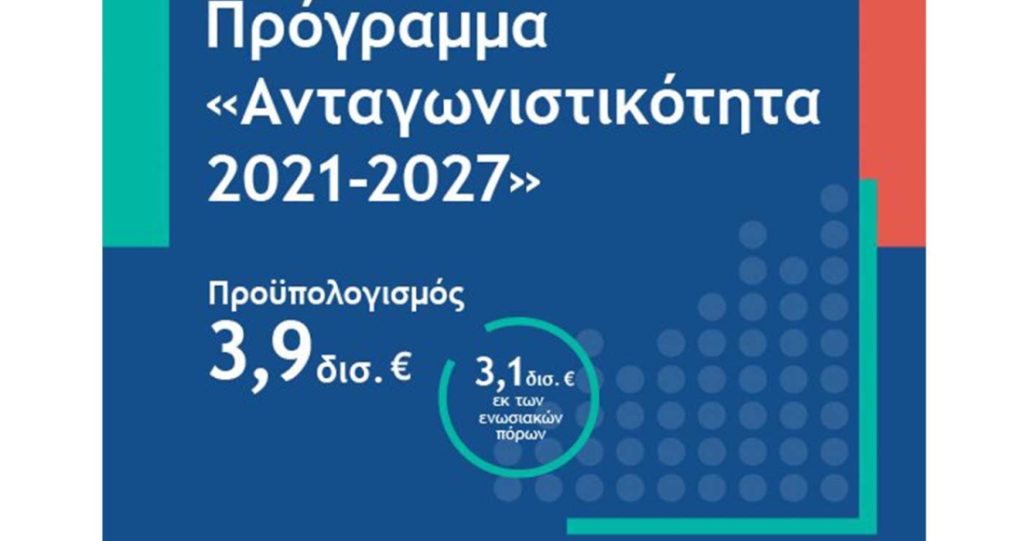
The Competitiveness 2021/27 Programme is an integrated intervention that will support the productive, competitive and outward-looking sectors of the economy in their transition to a growth model driven by the knowledge economy, largely reflecting the country's growth priorities and in line with the Commission's new priorities.
The Program is the tool for the implementation of the National Smart Specialization Strategy (ESEE). It links research and innovation with entrepreneurship and the strengthening of national and regional advantages.
The Program is also in line with the policies of the European Union for the digital and green transformation of the Greek economy. It promotes interventions and investments that contribute to the goals set at European level.
To address the challenges of the Greek economy in the 2021/27 programming period, comprehensive support initiatives will be needed. The aim is to cover the full range of business needs at the level of:
- Information
- strengthening collaborations
- development of new business models
- providing technological, human and investment resources
In the long term, the aim of the Program is to increase the size of Greek businesses and to strengthen their extrovert orientation so that they become a key lever for the development of the Greek economy.
In this context, the strategy of the Competitiveness Programme 2021/27 is complementary to the interventions of the REACT-EU which it finances:
- Short-term labour market measures
- health and support for SMEs with liquidity and solvency support
- investing in the green and digital transitions
It also complements the RRF Recovery and Resilience Facility which finances reforms and long-term investments for the productivity and resilience of the economy.
Negotiation and Consultation
The Programme was designed through a wide-ranging consultation organised by the Managing Authority under the supervision of the Special Secretariat for the Management of ERDF & CF Programmes of the Ministry of Development and Investments. It began in December 2020 and lasted more than a year.
The list of partners was compiled based on the requirements of the European Regulations and includes more than 76 bodies (e.g. Union of Regions of Greece, Central Union of Municipalities, ESAMEA, OAED, GSEE, GSEVEE, ESEE, SEV, SETE, Central Union of Chambers of Greece, TEE, OEE, XEE, Banking Associations, Economic and Social Committee, WCC, SEVE, SBE, SEPE, OESYN, the Greek Ombudsman, the National Transparency Authority, RAE, WWF etc.). In particular, the The 1st consultation round was conducted on the basis of an initial concept paper and a structured questionnaire in December 2020. The draft Programme Competitiveness 2021/27 is one of the first Programmes of the Partnership Agreement submitted by the Ministry of Development and Investment to start negotiations with the European Commission. It was filed as early as April 2021.
Following the informal submission of the Draft Programme to the European Commission, a 2nd round of consultation with the Managing Authorities of the Regions was held (May 2021). On 25/11/21 a wide online consultation took place on the 2nd edition of the Programme which had been officially submitted on 22/10/21 to the European Union. Following the formal consultations with the European Commission services, the programme was formally submitted on 9/5/2022.
It is the first Program of the Partnership Agreement (NSRF) to be submitted for approval to the European Commission.
Competitiveness 2021/27 - Available Resources
In total, the Competitiveness Programme 2021-2027 with a financial envelope of around €3.9 billion. Public Expenditure, of which €3.1 billion come from Community resources of the ERDF and ESF+ Funds sets priorities for strengthening the productive potential of the economy and the related human skills.
With a strong developmental footprint through high value-added actions and projects and with multiplier benefits for both society and the economy, the projects/actions of the Competitiveness 2021/27 Programme are expected to contribute substantially to closing the structural gaps of the Greek economy.
Priorities
The strategy of the Competitiveness Programme 2021/27 is organised around four main investment axes within the respective Funds:
1. Research and Innovation Support (ERDF)
2. Strengthening Entrepreneurship and Competitiveness (ERDF)
3. Improving Access to Finance for Enterprises (ERDF)
4. Human Capital Development in the context of Development Transformation (ESF+)
Strengthening Research and Innovation
The promotion of research and innovation is fully aligned with the country's strategy to place innovation at the heart of a sustainable and resilient recovery from the pandemic, to accelerate the green and digital transition and ensure Greece's technological development. Similarly, human resources need to develop the required skills to support upgraded business activity in all sectors.
The interventions will focus on creating conditions and supporting initiatives for the development of industrial research, technology transfer, industrialization of research results, start-up entrepreneurship in the 8 sectors of the National Smart Specialization Strategy (ESEE). Emphasis will also be placed on developing innovation ecosystems with objectives of excellence and a medium- to long-term perspective for sustainable development, to address the challenges of transformation and digitalisation.
At the same time, it seeks to meet the skills needs in the context of the directions of smart specialization, industrial transition and support of digital transformation, with interventions that upgrade and certify the abilities of human resources in horizontal (Industry 4.0, green economy) and sectoral specializations.
The relevant Actions include targeted training programs for business executives and utilization of specialized personnel by businesses.
Strengthening Entrepreneurship and Competitiveness
At the heart of national development policy are:
- the upgrading, expansion and shift of the production base to environmental
- friendly procedures
- the growth of the manufacturing sector
- interconnection with international markets
- to support the digital transformation of Greek small and medium-sized enterprises so that they can face international challenges and remain competitive
- Digital transformation
The main objective is the adaptation of Greek Industry and small and medium enterprises to the challenges of the 4th Industrial Revolution, by supporting the development and implementation of appropriate digital transformation plans. The aim is to shift the value chain of RES towards an outward-looking, innovative, recognisable and sustainable critical mass of digital products and services, capable of creating innovative entrepreneurship and/or introducing businesses in other sectors to global, digital value chains. The highest priority is to invest in the digital transformation of businesses. Including among others tourism businesses, modern culture and supply chain. Also their technological and organizational upgrade, with the aim of increasing domestic added value and entering (new) international markets.
- Small and medium-sized enterprises
The main goal is to improve the position of Greek production in international markets, through the operational flexibility and efficiency of businesses, faster production speeds and the organization of partnerships and new business models in smart value chains based on environmentally friendly processes and products.
Competitiveness 2021/27 - Indicative Actions of the Supported Programme
- Supporting productive investments with a focus on innovation, technological adaptation, digital transformation and shift to environmentally friendly processes and products
- Development of production of internationally tradable products and services
- Strengthening new / start-up entrepreneurship of high added value
- Supporting the development/adoption of innovations
- Encouraging clusters and/or collaborations of SMEs with each other and/or with larger enterprises
- Development / Upgrading of entrepreneurship support structures / mechanisms
- Environmental infrastructure / green development
Improving access to finance for businesses
The Programme is directed towards maximum use of financial instruments. Support for productive and/or innovative investment by SMEs, the establishment of start-ups as well as support small businesses medium capitalisation and small capitalisation enterprises for the achievement of specific objectives (internationalisation, green transformation) and some of the Access to Employment Actions can be implemented through the use of the following financial instruments, either individually or in combination with grants:
- Equity and risk-sharing financing
- Soft loans and guarantees
- Co-investment financing for more mature expansion and production development investments, etc.
- Thematic Funds (Internationalisation, Green Transformation)
Human Capital Development in the context of development transformation
Interventions in this context will support the human capital of entrepreneurship (including self-employment) through the development of micro and small enterprises, with priority given to innovative business ideas, with the ultimate aim of creating sustainable jobs. The aim is also to support businesses and employees to transition to the new realities of the time, through interventions
enhancing the skills of employees that will contribute to the adaptation of businesses. In particular, the development of employees' skills will support the targeting of businesses in new markets, the improvement of the
organization of work and production in sectors with a development perspective and high added value. Also, actions and tools will be activated that can be used by businesses seeking directions in issues related to innovation, technology, human resources development, strategic information.
Competitiveness 2021/27 - Flagship Actions of the Programme
The flagship actions of the Programme include:
- Research - Create - Innovate
- Equifund
- Green Fund for Sustainable Development
Simplification Initiatives
An important achievement of the last year and a half through EPANEK has been the gradual simplification in the implementation of actions to support small and medium-sized enterprises, with the reduction of the required supporting documents and the overall improvement of response times at the level of proposal evaluations and request management.
The planning for 2021-27 includes additional relevant management provisions and reforms such as:
- simplified procedures to be integrated into the new Management and Control System,
- reduction of the required supporting documents for the submission of a proposal and certification of expenses,
- preparation of a specific and timely timetable for the issuance of invitations to potential beneficiaries;
- drastic shortening of the evaluation time of proposals as the final selection, further reform of the PSKE by -among other things- shortening evaluation procedures and interconnection with other information systems (Taxisnet, ERGANI & GEMI).



